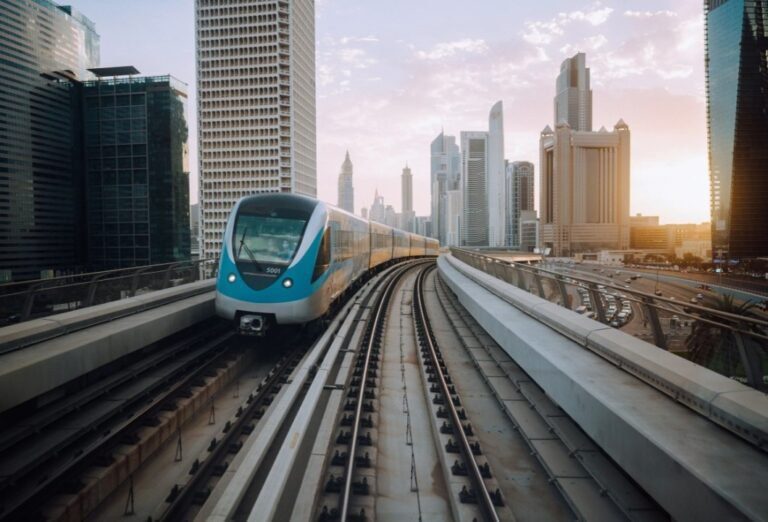Dubai residents are eagerly anticipating the expansion of the metro system, following the Executive Council’s announcement to increase the number of stations from 64 to 96 by 2030. This move aims to address the commuting challenges faced by residents in less densely populated and emerging communities, who save on rent but spend more time and money on transportation.
Transport Challenges and Resident Perspectives
Residents like Husameldin Elsayed from Dubai Silicon Oasis express optimism about the metro expansion. “The buses are good but it’s a circuitous ride, and commute time gets longer – especially in the afternoon – when entrances to the community get crowded. The planned addition of metro stations would be incredibly beneficial. It would make commuting more time-efficient and reliable as we can avoid delays caused by traffic on the road. This will not only make daily travel smoother but will also enhance the overall quality of life,” Elsayed noted.
The Executive Council announced plans to extend the Dubai Metro from the current 64 stations (covering 84 km) to 96 stations (140 km) by 2030, with further expansion to 140 stations (228 km) by 2040. The Roads and Transport Authority (RTA) aims to increase public transport usage across the emirate to 45 percent, reduce carbon emissions to 16 tonnes per capita, and improve the efficiency and convenience of sustainable transport.
Dr. Monica Menendez, associate dean of Engineering for Graduate Affairs at New York University Abu Dhabi (NYUAD), emphasized the importance of expanding the metro system. “Expanding the metro system is a great start. Hopefully, this will be complemented by the expansion of other types of public transportation, as well as more active modes of transportation and the provision of more flexible concepts with the aid of new vehicle technologies.”
Impact on Urban Development
Menendez highlighted that transit-oriented development will significantly alter Dubai’s landscape, traditionally seen as car-centric. “The goal is to create a public transportation system that offers as much flexibility and personalisation as possible, so we feel compelled to use that instead of our cars.”
Indian expat Arijit Nandi, residing in The Springs, echoed this sentiment. He shared, “The convenience of using the Metro is not just about saving time, but also being practical. For someone who travels a lot like me, I always prefer to take the Metro to the airport as it’s more convenient to avoid traffic and parking fees. It will be a big relief if there will be a metro station in our community.”
For residents like Mawada El Magboul from International City, the absence of a nearby metro station poses mobility challenges. “The closest metro station is located at Al Rashidiya, requiring a 15-minute taxi ride that costs around Dh35 each way, assuming there is no traffic congestion. Alternatively, residents can utilize one of the three bus lines serving the Al Rashidiya station. But these buses run only every 20 minutes. If I miss the bus, I will have to wait for another 20 minutes. And sometimes, these buses are full that I have to wait for the next one. We are desperately awaiting a Metro station in our area. It would be a game-changer for residents.”
Future Metro Developments
Residents like El Magboul will soon see improvements. The RTA announced the 30km Blue Line Dubai Metro extension, set for completion by 2029. This extension will connect Dubai International Airport (DXB) with nine key areas, including Mirdif, Al Warqa, International City 1 and 2, Dubai Silicon Oasis, Academic City, Ras Al Khor Industrial Area, Dubai Creek Harbour, and Dubai Festival City. The Blue Line will feature a 1,300-meter long viaduct crossing over the historic Dubai Creek, linking Al Jaddaf with Dubai Festival City and Dubai Creek Harbour.
Economic Implications
The metro expansion is also expected to influence property values. Andrew Elliott, director of the Commercial Agency at Dubai-based real estate consultancy Chestertons, explained, “Property values can significantly increase as a result of the construction of new train or metro stations for a number of reasons, including increased footfall in the area, improved accessibility, higher property demand, and better connectivity. A metro station can make the surrounding area more attractive for commercial and residential properties, driving up rental rates and property values.”
He added, “Some people may even see it as an opportunity to ditch the car and invest the money in a better property, with the added convenience of public transport on the doorstep. The focus on sustainability and reducing carbon emissions will make properties near metro stations more attractive to environmentally conscious investors and residents. Enhanced public transport infrastructure will play an increasingly crucial role in supporting Dubai’s vision of becoming a global hub for business and tourism.”


